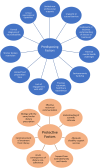Benefits of Integrated Social Care in the Management of Patients With Inborn Errors of Metabolism
- PMID: 40376563
- PMCID: PMC12079764
- DOI: 10.1002/jmd2.70023
Benefits of Integrated Social Care in the Management of Patients With Inborn Errors of Metabolism
Abstract
The current cornerstone of the management of many small-molecule inborn errors of metabolism (IEMs) is a combination of dietary therapy and medication, with evidence for improved clinical outcomes. However, the burden imposed on patients and families is substantial. Many families also have to manage this burden in conjunction with other medical, psychosocial, and financial stressors. Adherence to the recommended treatment can therefore be extremely challenging, sometimes leading to sustained derangement of biochemical parameters and/or clinical deterioration. The treating team needs to work with the family to determine an individualized optimal management strategy, with targets that can be pragmatically achieved. This paper focusses on the role of social care in assisting patients with a range of different small-molecule IEMs, as well as their families and the medical team. We provide six case vignettes that illustrate how social care involvement, in addition to enhanced psychosocial support from the clinical team, resulted in improved outcomes. This included assisting with adjustment to a new diagnosis, exploring and addressing barriers to treatment adherence, and provision of 'early help' community supports. In some instances where this was not sufficient and risk of harm to the child was considered significant, social care involvement facilitated graded escalation from a "child in need" approach to formal child protection measures. We identified challenges in engaging social workers external to the metabolic team. This included a need for greater education about the medical condition and the risks associated with undertreatment, lack of protected time for metabolic case management, and a lack of preventative involvement of social workers during the initial hospitalization (impacting on patient rapport). We advocate for the integration of social care within the metabolic team as part of a more holistic model of care.
Keywords: child protection; dietary management; inborn errors of metabolism; medication compliance; social care; social work.
© 2025 The Author(s). JIMD Reports published by John Wiley & Sons Ltd on behalf of SSIEM.
Conflict of interest statement
The authors declare no conflicts of interest.
Figures


Similar articles
-
Vesicoureteral Reflux.2024 Apr 30. In: StatPearls [Internet]. Treasure Island (FL): StatPearls Publishing; 2025 Jan–. 2024 Apr 30. In: StatPearls [Internet]. Treasure Island (FL): StatPearls Publishing; 2025 Jan–. PMID: 33085409 Free Books & Documents.
-
Tuberculosis.In: Holmes KK, Bertozzi S, Bloom BR, Jha P, editors. Major Infectious Diseases. 3rd edition. Washington (DC): The International Bank for Reconstruction and Development / The World Bank; 2017 Nov 3. Chapter 11. In: Holmes KK, Bertozzi S, Bloom BR, Jha P, editors. Major Infectious Diseases. 3rd edition. Washington (DC): The International Bank for Reconstruction and Development / The World Bank; 2017 Nov 3. Chapter 11. PMID: 30212088 Free Books & Documents. Review.
-
Right care, first time: a highly personalised and measurement-based care model to manage youth mental health.Med J Aust. 2019 Nov;211 Suppl 9:S3-S46. doi: 10.5694/mja2.50383. Med J Aust. 2019. PMID: 31679171
-
Promoting and supporting self-management for adults living in the community with physical chronic illness: A systematic review of the effectiveness and meaningfulness of the patient-practitioner encounter.JBI Libr Syst Rev. 2009;7(13):492-582. doi: 10.11124/01938924-200907130-00001. JBI Libr Syst Rev. 2009. PMID: 27819974
-
A holistic approach to the patients/ Families with inborn errors of metabolism.J Mother Child. 2020 Oct 2;24(2):65-72. doi: 10.34763/jmotherandchild.20202402si.2004.000010. J Mother Child. 2020. PMID: 33179604 Free PMC article. Review.
References
-
- Gambello M. J. and Li H., “Current Strategies for the Treatment of Inborn Errors of Metabolism,” Journal of Genetics and Genomics 45, no. 2 (February 2018): 61–70. - PubMed
-
- Vernon H. J. and Manoli I., “Milestones in Treatments for Inborn Errors of Metabolism: Reflections on Where Chemistry and Medicine Meet,” American Journal of Medical Genetics Part A 185, no. 11 (2021): 3350–3358. - PubMed
-
- MaCdonald A., van Rijn M., Feillet F., et al., “Adherence Issues in Inherited Metabolic Disorders Treated by Low Natural Protein Diets,” Annals of Nutrition & Metabolism 61, no. 4 (2012): 289–295. - PubMed
LinkOut - more resources
Full Text Sources

